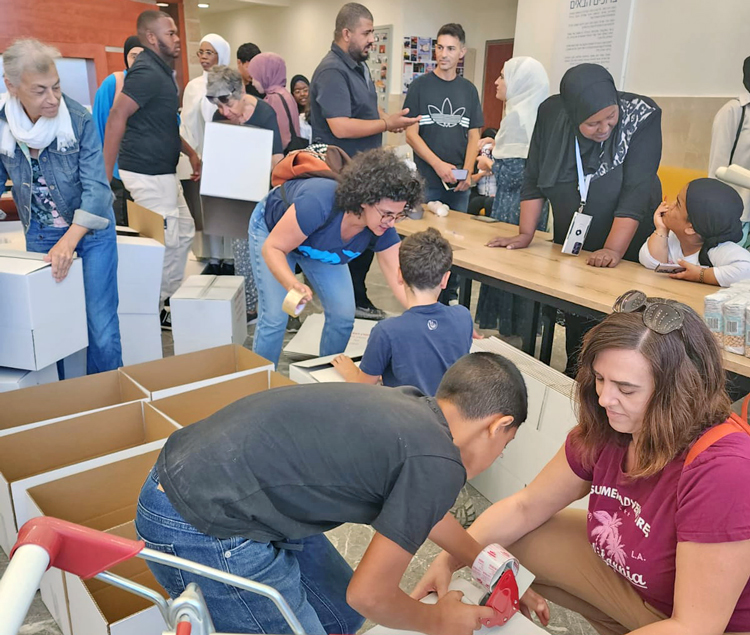Tehran-backed Hamas has “lost control of Gaza,” Israeli Defense Minister Yoav Gallant announced Nov. 13. But there is still a road ahead to eliminating the murderous Jew-hating organization, which is holding hostages in their network of tunnels in Gaza.
A decisive defeat of Hamas and its allies in Gaza will prevent them from carrying out their stated goal of slaughtering more Jews; help defend Israel’s right to exist as a safe haven for the Jewish people; open the door to Palestinians in Gaza having more control over their lives; and give an important boost to the fight against Jew-hating violence rising worldwide. It will set back attempts by the bourgeois-clerical regime in Iran to extend its counterrevolutionary influence in the region.
Apologists for Tehran and Hamas claim that reports that Hamas, Islamic Jihad and its allies slaughtered civilians are “fake news.” They hope to help Hamas survive to massacre again by putting pressure on Washington, Paris and other powers to demand Israel agree to an immediate cease-fire.
But their modern-day Holocaust denial falls apart in the face of the facts of the gruesome Oct. 7 assault — the largest single-day massacre of Jews since World War II — and Hamas’ brutal use of Palestinian civilians in Gaza as human shields.
Getting an accurate number of those murdered is difficult because the Hamas death squads not only tortured and raped many of their victims — often filming their barbaric acts — but also mutilated and dismembered bodies. They tossed thermobaric grenades that release a plasma cloud that reaches 5,400 degrees Fahrenheit into rooms as they went door to door, incinerating whole families.
The Israeli government has enlisted archaeologists to help identify the remains, recently revising its estimate to 1,200 dead. More than 5,400 were wounded and the gunmen took 240 people hostage.
The Palestinian people in Gaza are suffering harsh conditions as a result of Hamas retreating to their extensive tunnel network under hospitals, schools and apartments. But that is exactly what Tehran, Hamas and their allies wanted. They’ve done everything in their power to prevent people in Gaza City — where Hamas is based — from fleeing to the south.
“We knew there was going to be a violent reaction,” Hamas official Basem Naim told the press Nov. 10. “We are proud to sacrifice martyrs.” Hamas’ central leadership — living it up in Qatar and other countries far from the conflict — uses Palestinian deaths to gain sympathy and financing from the United Nations, the regime in Qatar and others.
War on Hamas, not Gaza people
Hamas claims that Israel is targeting hospitals and committing genocide, a charge echoed by its apologists around the world. But as Israeli soldiers consolidate their control over Gaza City, they are showing Hamas bases and arms depots built in their tunnels under area hospitals.
Why base Hamas underneath hospitals? “You won’t strike them,” Omar Abu Rusha, a captured Hamas member, told Israeli interrogators.
IDF spokesperson Adm. Daniel Hagari showed photos of a Hamas command center in the basement of the Rantisi children’s hospital to the press Nov. 13. Israeli forces entered after working with the hospital management to make sure patients were evacuated to a safer place.
They found a wide variety of weapons there. “Hamas uses hospitals as an instrument of war,” Hagari said. “Our war is against Hamas, not against the people in Gaza.”
On Nov. 14 Israeli soldiers entered Al-Shifa Hospital, the largest hospital complex in Gaza City, which Israel says is a key Hamas command center. They have already found weapons stored underneath it.
Hamas’ dictatorial grip on Gaza is cracking. Hundreds of people at a U.N. shelter in Gaza City have been shouting insults against Hamas in the middle of the night when its rockets are heard streaming toward Israel.
Angry crowds hurled stones at Hamas police who cut in front of Gazans on line waiting for water and forced them to flee, The Associated Press said. On Nov. 7 a young man with a bandaged wrist briefly disrupted a televised press conference in Gaza by Iyad Bozum, Hamas interior minister. “May God hold you to account, Hamas!” the man yelled.
On Nov. 14, a reporter for Al Jazeera asked an elderly man at a Gaza hospital how he got hurt. The man replied, “Why is Hamas hiding among us civilians? Why don’t they go to hell and hide there instead?” The reporter cut off the interview and walked away.
Arab citizens of Israel
Defenders of Hamas and Tehran never mention that 21% of the population of Israel are Arabs. A poll taken since Oct. 7 by the Israel Democracy Institute found that 70% of Arab citizens of Israel say they feel part of the country, a big rise since June when only 48% said so.
While Hamas’ main goal Oct. 7 was to kill as many Jews as possible, it also killed immigrant farmworkers and 24 Arab citizens of Israel and is holding seven as hostage. Many Arabs in Israel know what it would mean for both Jews and Arabs if Hamas and Tehran were successful.
Jamal Waraqi is a Muslim volunteer in Israel’s ZAKA emergency rescue service, which has been part of efforts to identify the remains of those killed Oct. 7. “I am a part of this country, like every Arab, Muslim, Druze and Christian,” he told Channel 12 News. “We have to do our part.”
Hamas falsely portrays itself as fighting for the interests of the Palestinian people and tries to take advantage of the discrimination and racism that exists in Israel to gain followers among Palestinian citizens and permanent residents of Israel.
Saleh Badriya and his wife, Atheel Badriya-Halabi, are members of the Arabic-speaking Druze minority in Israel and are helping to get out the truth about the Hamas atrocities. Unlike Palestinian and Bedouin Arabs in Israel, Druze men can be drafted and many are veterans of the Israel Defense Forces.
“We’ve met with a lot of Arab students in universities, some of whom have opinions that aren’t easy, but they’re starting to say that if that is Hamas’ way to free Palestinians, they don’t want anything to do with it,” Baridya-Halabi told the Times of Israel. “We’ve worked hard to show Arab Israelis, in particular, that this is a terror organization, that it’s worse than ISIS.”
One reason Tehran and Hamas chose to attack in October was that they thought heated divisions inside Israel over a judicial reform backed by Prime Minister Benjamin Netanyahu would weaken the Israeli government’s response.
Instead, the pogrom “was a wake-up call,” retired Israel Chemicals worker Martin Stone told the Militant by phone from Beersheba Nov. 14. “Everyone united around this and sees that we need to see this through.”
“Before this a lot of Israelis were talking about moving to another country. Instead, they are staying and more Jews want to move here,” he said. “In Europe they tell Jews to keep a low profile.”
Thousands of Israelis are volunteering to salvage crops planted near the border with Gaza, after many immigrant farmworkers quit, fearful in the wake of the Hamas attack.
Bringing together Jews and Arabs
Meetings that bring together Jewish and Arab citizens of Israel are being organized around the country “to talk about solidarity instead of incitement,” Chloé Portheault, spokesperson for the Negev Coexistence Forum for Civil Equality, said by phone Nov. 13. “We know that not everything is flowers in relations between Jews and Arabs, but what is important is that everyone tried to help each other.” The Coexistence Forum works to build “Arab-Jewish partnership.”
Many Bedouin Arabs, who live in southern Israel, helped rescue people who had been attacked by Hamas, Portheault noted. Now many of the farms and factories where they work have been closed because of the war.
At the Jewish community center in the predominantly Bedouin town of Rahat in central Israel, hundreds of Jewish and Bedouin Israelis every Wednesday since Oct. 7 gather to pack boxes with food, toys and toiletries for those most affected. Half go to Bedouin families and half to Jewish families in nearby towns.
Blatant thuggery, Jew-hatred
The Jew-hatred and thuggery of organizers of pro-Hamas demonstrations in the U.S. are becoming more open. At a “Flood Manhattan for Gaza” protest Nov. 10, participants chanted, “We don’t want a Jewish state,” and “Settlers, settlers go back home! Palestine is ours alone.” Tehran and Hamas claim Jews in Israel, including small children, are “settlers” and fair targets for killing.
One pro-Hamas participant told a counterprotester, “I’ll f–k you up if I see you!” the New York Post reported.
But opponents of Jew-hatred refuse to be silent. Jewish student groups on campus have organized protests against Jew-hatred. And over 200,000 people gathered in Washington, D.C., Nov. 14 to defend Israel’s rights to exist as a refuge for Jews.
Meanwhile, it’s becoming clearer that despite the Joseph Biden administration’s professed support for the war to defeat Hamas, the White House is stepping up pressure on the Israeli government to pull back. It says that Israeli forces must do more to protect civilians and should accept a cease-fire, under the guise of “pausing” the fighting. But that would open the door for Hamas to re-organize and prepare more pogroms. In fact, the Israeli government does pause its assaults for four hours every day to let civilians get out of areas its forces are targeting.
“The State of Israel will not stop its operations in Gaza until our troops fulfill their missions; destroying Hamas and returning our hostages home to their families,” Defense Minister Galant pointedly told U.S. diplomat Brett McGurk Nov. 14.


